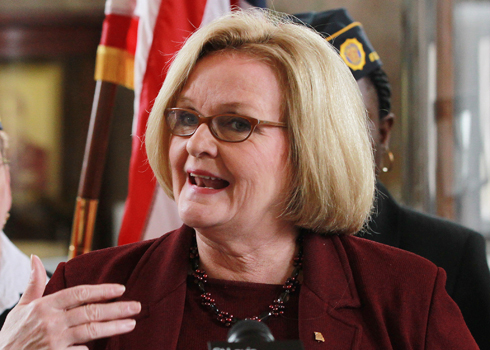When it comes to earmarks, Sen. Claire McCaskill (D-MO) is accusing House Republicans of wanting to have their cake and eat it too.
House Republicans, she told reporters earlier this week, have added numerous line items for special projects into the defense-authorization bill, and thus, are violating their own self-imposed earmark moratorium.
The House Armed Services committee marked up the bill last week, passing near unanimously with only one Democrat opposed. It would match the administration’s request of $553 billion for defense spending, while including funding for an alternative engine to the F-35 fighter, which the White House and the Pentagon oppose.
McCaskill questioned Republican amendments that added funding ranging from thousands to several millions of dollars in special projects.
“Why in the world are all these amendments being offered for these small amounts if this is not a back-door attempt to get earmarks,” said McCaskill. “They tried to pretend they weren’t, but a duck is a duck is a duck.”
House Republicans made much of their effort to ban earmarking, the process by which members direct funding to specific pet projects, at the beginning of the 112th Congress. Newly elected Tea Party candidates determined to cut spending, as well President Obama, support the moratorium.
McCaskill says House Republicans are now circumventing the earmark ban by making language of an amendment authorizing a project so specific that it could only conceivably apply to one business or organization.
Under GOP rules banning earmarks, each amendment to a particular spending bill must include language affirming that the contract will be awarded by merit through a competitive-bidding process. But by writing the provisions narrowly, members can reduce, if not eliminate competition and all but guarantee the money goes to the company or organization of their choice. This is particularly true for the defense industry.
For example, Rep. Duncan Hunter (R-CA) included an amendment adding $5 million dollars for development of helicopter “brownout” situational awareness tools, funding he also introduced in the Fiscal Year 2010 defense authorization bill. Only for that year, the money was specifically earmarked to TREX Enterprises – a company his uncle founded – while this year it is not. The situational awareness tools would allow helicopter pilots to remain aware of the ground when the rotors “brownout” visibility due to dust.
Rep. Buck McKeon (R-CA), chairman of the House Armed Services committee, reminded his colleagues in an open letter that he would strictly adhere to the Republican moratorium once he brought the bill to the floor.
“The House Armed Services Committee bill contains no congressional earmarks. Moreover, I will not support any amendments for Congressional earmarks during consideration of the National Defense Authorization Act for Fiscal Year 2012 on the House floor.”
When TPM pressed for additional comment, a spokesman for the Armed Services Committee rejected McCaskill’s account, saying she was “off base” and that the bill was earmark free. Indeed, many of the bill’s 219 amendments were offered not just by Republicans, but by Democrats as well.
Outside groups say the devil is in the details, as well as the definition of what constitutes an earmark. Laura Peterson, a senior policy analyst for Taxpayers for Common Sense, said the current system, while an improvement over years past, still allows some wiggle room when it comes to bringing home the bacon.
“While the newly transparent process is commendable and necessary, it’s no guarantee that Congressional additions aren’t rooted in parochial interests,” said Laura Peterson, senior policy analyst for Taxpayers for Common Sense. “[Precedent] shows a lot of these projects have a history of such interest even if they no longer fit the technical definition of earmarking.”
Susan Crabtree contributed to this report.










